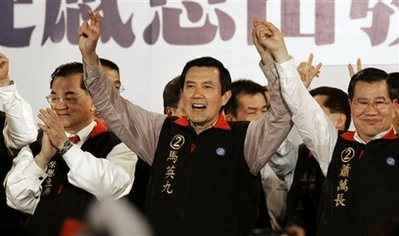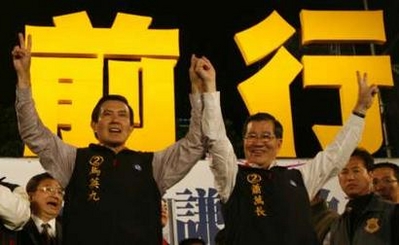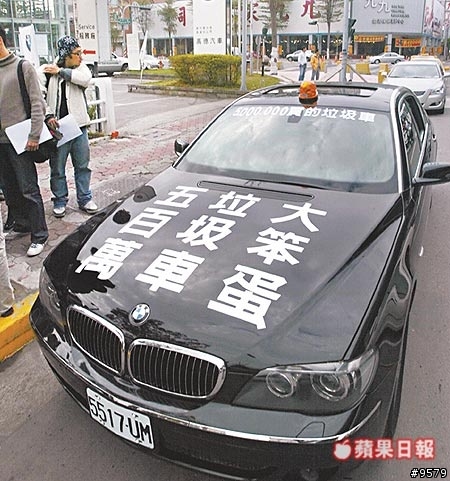I love this article.
TAIPEI (Reuters) – Taiwan President Chen Shui-bian could face more obstacles after his term expires following a career of challenges that saw him rise from peasant roots to become the island’s first opposition president.
As soon as his two-term, eight-year post ends on May 20, Chen could be charged with corruption, no longer protected by immunity afforded to a president.
“It may be the end of his glory days and he could very possibly face charges — the future does not look rosy for him,” said Shane Lee, an analyst and political science professor at Chang Jung University.
Chen has denied any wrongdoing.
A member of the Democratic Progressive Party (DPP), Chen is viewed as a wily politician driven by passion to create a separate identity for Taiwan, an island which giant neighbor China claims as its own. Rocky relations with China dominated his first term.
China has repeatedly blasted Chen for pushing a referendum on whether to seek U.N. membership for Taiwan as a separate country. He has also been criticized by the United States for trying to upset the status quo.
China has claimed sovereignty over Taiwan since the end of the Chinese civil war in 1949. With U.N. Security Council member China recognized by 170 countries and Taiwan by just 23, there is no way Taiwan’s U.N. bid can succeed.
Chen, however, is unbowed.
“Only if China transforms into a truly democratic nation will there be hope for sustainable peace in the region,” Chen said during an international human rights forum in February.
This week, Chen called Chinese President Hu Jintao a “butcher” following the crackdown or riots in Tibet.
“AH BIAN”
Born in 1950 to a peasant family in southern Taiwan and affectionately nicknamed “Ah Bian,” Chen almost died as a baby, and his family didn’t officially register his birth until 1951.
After growing up in the southern Taiwan city of Tainan, Chen passed the bar exam with flying colors while still a student at the prestigious National Taiwan University in the early 1970s, making him one of the island’s youngest lawyers.
In his 2004 presidential re-election campaign, Chen again escaped death when he survived a controversial assassination attempt after being grazed by a bullet from a home-made gun.
Chen went on to win the election by a razor-thin margin, with the main opposition Nationalist Party (KMT), which had ruled Taiwan continuously from 1949 until Chen’s first victory in 2000, saying the attack was staged to win votes.
He cut his political teeth by battling the establishment, defending an opposition leader facing the death penalty for defying martial law by organizing a demonstration in 1979.
In 1986, he was jailed for eight months for libeling a Nationalist politician.
After his release, he joined the DPP and won a seat in parliament in 1989. Chen then won a 1994 race for Taipei mayor — one of the island’s most high-profile jobs — and got plaudits for sprucing up the congested city.
He became president in 2000, but has been dogged by numerous scandals involving aides and family members since 2004. Huge demonstrations were organized in 2006 calling for Chen to resign.
The likely corruption charges stem from suspicion of misuse of discretionary government funds. Prosecutors have not given a figure, but his wife has already been indicted on similar charges in a trial that is still in progress.
“We will indict Chen after he leaves office unless other factors or barriers intervene first,” said Chang Wen-cheng, an official in the high-court’s prosecutors office.
I cannot wait to see Ah-Bien, his wife, and his son-in-law go to jail.


